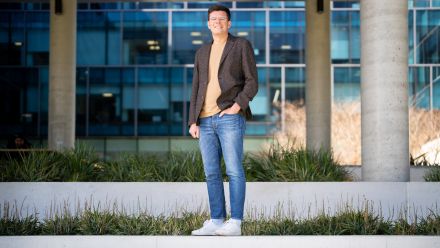Financial health FAQs
Read the Vice-Chancellor's message from 24 June here.
What is the University's financial position?
As stated in the VC's announcement, for the 2020 calendar year, the University has a $225 million shortfall. This includes lost revenue of $150 million and extra costs of $75 million, such as urgent IT upgrades to facilitate remote operations and increased cleaning services.
The University has already taken immediate measures to reduce our expenditure, including pausing capital works and recruitment. We've also saved a significant amount by not travelling.
These measures have helped keep the remaining shortfall to be recovered to $100 million.
This means, for the remainder of 2020, we need to find $100 million in savings.
Unfortunately, 2021 and 2022 revenue is looking increasingly uncertain, but measures taken in the next six months will help us face an uncertain future with a greater degree of confidence.
How long do we expect to be in this financial position?
There are a number of factors that contribute to our financial position that are outside our control. These include international travel restrictions, government policy and funding, and demand for higher education around the world.
These challenging financial circumstances are expected to last for at least the next two years. The impact on ANU was slightly cushioned by the progress we have made to achieve a truly diverse student cohort and we are continuing with that work.
When will everything return to normal?
We don't expect to ever return to business as usual pre-COVID, but the founding principles of ANU and our community spirit remain. We will continue to adapt, and we must be willing to be both innovative and measured in this uncertain time.
Does this mean there will be job losses?
Staffing is our biggest expense. As per the Vice-Chancellor's message, we will do everything we can to explore voluntary, rather than involuntary measures, and we are absolutely committed to ensuring ANU continues to deliver its mission and is prepared for the years ahead.
The Vice-Chancellor, College Deans and Portfolio Heads will need to make resourcing decisions that reflect the nature of our financial position and our ability to continue to deliver world-class research, education and evidence-based public policy outcomes.
To ensure the University operates efficiently and effectively, it regularly reviews all its operations and Colleges and Portfolios will continue to do so as part of this process.
What will this mean for staff on casual contracts?
In Semester 1, 2020, we committed to maintaining casual and fixed-term teaching contracts. However, with reduced student numbers and the possibility of the reduction of some research activity, we need to look at our staffing profiles and match them to the work required.
The decision about continuation or renewal of contracts will be made in your local area. College Deans, School Directors and Portfolio Heads will be responsible for ensuring these decisions are made to support the priorities of the local area and the work needed to ensure the University continues to deliver on its core academic mission.
Can I express interest in a voluntary separation? Will my entitlements be honoured?
We are looking at mutually agreed separation packages as part of our full suite of measures. Any program with tax incentives for voluntary separations must be approved by the Australian Tax Office and we have not made any final decisions on this yet.
The University's current financial position has no impact on staff entitlements such as long service leave and personal leave.
Staff who are interested in a voluntary separation should speak with their College General Manager or Service Division Director.
Will staff be stood down until the University is in a better financial position?
This option is not under consideration as part of our suite of measures as these programs are for businesses whose operations are effectively in hibernation. The University has been operating throughout the COVID-19 pandemic, and we expect to continue to do so.
What happens to my salary?
In June, the Vice-Chancellor asked staff to vote on the scheduled pay rise for July 2020 and July 2021 and whether these should be deferred.
The proposed variation was accepted by a majority of staff who voted in the electronic ballot which closed at 4pm on Tuesday 23 June 2020.
There are no other changes to the Agreement.
More information about the variation to the Enterprise Agreement can be found here.
Will staff still get the scheduled pay rise in July 2020?
Staff have voted to defer the scheduled two per cent salary increase for July 2020 to occur in July 2021, and the scheduled increase for July 2021 to occur in July 2022.
The University will now make an application to the Fair Work Commission to have the variation to the Agreement formally approved. The Agreement will come into effect on the date of this formal approval.
You can listen to recordings from the staff information sessions on the proposed variation to the Enterprise Agreement. Sessions were held on Thursday 11, Friday 12 and Monday 15 June 2020.
How much money will ANU save by deferring the July 2020 pay rise?
Should the Commission endorse the deferral, we will be able to save approximately $6.75 million this year and $13.5 million over 12 months.
Will staff be asked to take leave, such as annual leave or long service leave?
Yes, we already do this annually and have done so since 2013. It is a good and healthy practice to take a break from the workplace and it also helps us manage our cash flow. However, no additional measures are planned.
Will I be able to keep working remotely, or part-time, or continue my flexible arrangements?
We are committed to a flexible and fair workplace. We will continue to support staff to discuss their circumstances with their supervisors and put in place Individual Flexibility Agreements and Home Based Work agreements. These agreements have no impact on job security.
Will the University seek to renegotiate another variation to the current Enterprise Agreement.
No final decision on this has been made. Any new Enterprise Agreement will need to be agreed to by staff.
Why hasn't the University shared the 2019 Annual Report as a further tool to help the community understand University finances?
The Annual Report will not become a public document until it is tabled in parliament. As we do every year, we'll make it available as soon as it is tabled.
What is the University doing to address the budget situation?
The Senior Management Group has endorsed and the University Leadership Group has reviewed the ANU Financial Health Strategy including the need for expenditure control for 2020-2022.
What has been agreed is that the University must adopt an Expenditure Control Framework for financial management. In practice, this means that each College and Portfolio area will be given an overall savings target and each Dean and Portfolio Head will be responsible for working with their Schools and Divisions to determine the most appropriate way to achieve these savings. There is no one size fits all solution to our financial situation, so we are ensuring that Deans, Directors and Portfolio Heads continue to be empowered to make decisions relevant to their context.
However, the overall strategy recognises that implementing expenditure control alone will not enable a financially sustainable future. Strategic discussions about revenue generation and University priorities will be a key topic for the Senior Management Group throughout the year. All decisions taken will be focussed on ensuring the University continues as one of the best universities in the world.
We are in discussions with the Australian government to ensure the higher education system, and the national university, are fit for purpose in the post COVID-19 world. We are looking to expand our domestic student intake during the likely surge for demand in the next 10 years, and we will increase our postgraduate offerings. For some time, we have been actively putting in place strategies that seek to diversify our international recruitment, and that work is continuing.
On the research side, we are exploring relationships with corporations for joint research initiatives and are working with government on key public policy areas such as the COVID-19 response and climate change adaptation.
We are also working with philanthropists to help support our research and invest in Australian students' education at the national university.
What sorts of decisions will be made locally?
Each College Dean and Portfolio Head is accountable for the allocation of the funding within their area. We are looking to you to help us generate cost-saving ideas. However, based on our consultations to date the types of decisions being made locally are likely to include:
- Cancelling some memberships and subscriptions
- Exploring lower cost options for academic collaboration and networking (eg limiting travel to conferences)
- Delaying high-value outlays such as major equipment purchases
- Reducing the use of, and spending limits on, purchase cards to ensure probity in expenditure processes
- Pausing local-level funding schemes for research programs and requiring additional approval for professional development expenditure
- Reducing the frequency of, or changing the model, for public and social events
- Reducing or phasing out low value international partnerships
- Reconsidering sponsorship arrangements
- Investigating better procurement practices to ensure better value for money, eg preferred supplier contracts for travel
In addition to the current hiring pause, we would expect increased scrutiny on workforce decisions - such as the continuation or extension of casual and fixed-term contracts, and the replacement of vacancies occurring through resignations and the renewal of loadings.
Regardless of our financial circumstances, no delegate can unilaterally make decisions that affect the Enterprise Agreement, stop the achievement of the University's Strategic Plan, or will irreparably damage the University's reputation.
Why don't we use our cash reserves?
On paper, our financial reserve is large: over $1.8 billion. But we have already removed $200 million to help pay our costs in 2020. The remainder is already committed, or is not ours to spend:
- Over $718 million is contained in our obligations to the Commonwealth Superannuation Scheme
- Almost $349 million is in protected endowments, which we cannot spend for any purpose other than that for which they were provided.
- $120 million is retained to cover our staff leave entitlements.
- $30 million covers our Workers Compensation obligations.
We also have just over $400 million cash in the bank and this will cover a little over four months' of our operating costs. We require this amount to pay our bills and our salaries to remain solvent. A waterfall graph of our finances is available here.
Will cost-cutting measures affect research programs?
Research that relies on external funding will be delivered in consultation and cooperation with our funding partners. We will be working with Chief Investigators to help improve their spending forecasts.
For internally funded research programs, decisions on this spending will be determined by each College or Portfolio. This applies to travel and field-work associated with research programs that are internally funded (if government mandated travel restrictions are lifted). Researchers with long term travel and fieldwork plans should begin these discussions with their supervisor as soon as possible.
Will the University proceed with ongoing major capital works programs?
In almost all cases, yes. Delaying most of the projects that are underway is more costly than completing them. We have put a pause on all new capital works projects.
Will the University seek to raise revenue through on campus costs charged to staff and the community (for example, increasing parking costs or accommodation costs)?
These decisions will be considered on a case by case basis and in line with the Campus Master Plan released in 2019.
Will there be further consultation with staff about expenditure measures?
The Vice-Chancellor commits to remaining as open and transparent as possible, though some of the discussions and negotiations will be commercial-in-confidence.
The Vice-Chancellor will host a series of forums in coming weeks to answer any questions you have, and he will host a brainstorming session to hear any ideas you might have about ways to make savings or raise revenue. Details on those forums are here.
Any discussions about changes to staff entitlements will be held openly and fairly with the ANU community.
The Vice-Chancellor and University leadership will continue to share information as it is available through the VC's regular blog, staff and student forums and the ANU website.
Will ANU staff be eligible for JobKeeper payments?
At this stage, the University does not qualify for the JobKeeper program. Based on our current revenue predictions we do not expect to be eligible even if the Government changes its policy.
Will ANU implement remote learning options in the future? Would these courses be discounted?
We consider the campus experience to be as much a part of a student's tertiary education as the academic elements. We aim to ensure students from all over Australia, our region and the world can learn from each other as much as they learn from their world-class teachers. While there has been immense innovation in teaching methods throughout the pandemic, and we will be continuing a mixed model of remote and on campus course delivery in Semester 2, the University is excited to see its students return to our beautiful campus, and participate in university life with their peers, their teachers and our academics. There is a misperception that online course delivery is cheaper; part of the unexpected costs the University faced this year was the delivery of remote teaching and learning. We don't anticipate a significant shift towards online course delivery but we will consider on a case by case basis. For example, there are some courses that only ANU teaches, that are unique to ANU, and we are considering making these courses available to a worldwide audience through online delivery.
When can I expect more information?
The Vice-Chancellor has committed to regularly updating the community as planning continues and major decisions are taken. He will provide information through his regular blog or emails to the community.
This FAQ page will be updated regularly as more questions are posed by our community. If you have questions, please use the "Ask a Question" button on this page. Please note, all enquiries relating to personal circumstances will be forwarded to HR for actioning and will not be published.
We have also published a Financial Health section on our website, which will be updated regularly.
Last updated 24 June, 11am


